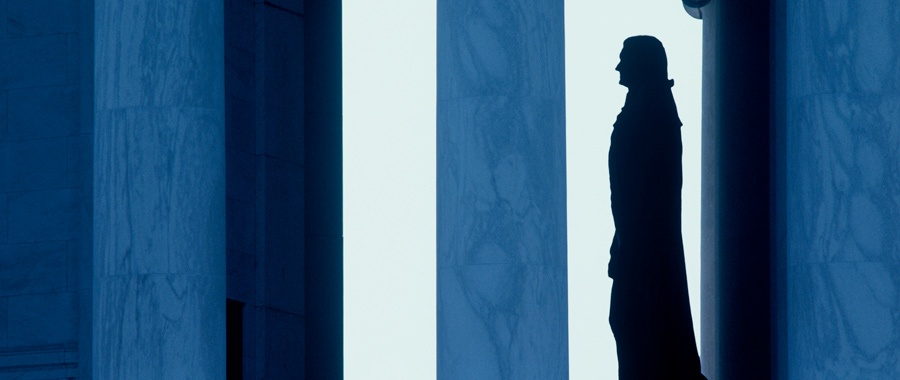In the annals of American history, the complex tapestry of freedom, liberty, and human rights is often contrasted against the grim backdrop of slavery. One pivotal figure intertwined with these themes is Thomas Jefferson, a Founding Father whose legacy is as contentious as it is revered. Within the framework of Baha’i teachings, we have an opportunity to reassess Jefferson’s contributions through a lens that transcends mere historical interpretation, enabling a more profound understanding of freedom, justice, and the dignity of human beings.
The Baha’i Faith asserts that all humanity is part of a single family, advocating for the elimination of all forms of prejudice and oppression. The contradictions present in Jefferson’s life, particularly his ownership of slaves juxtaposed against his articulate advocacy for liberty, provoke critical inquiry into the meaning of freedom itself. To explore this tension within the context of Baha’i teachings not only illuminates Jefferson’s multifaceted legacy but also compels us to confront our own beliefs about race, equality, and human rights.
Jefferson’s Declaration of Independence boldly articulated the universal right to life, liberty, and the pursuit of happiness. Yet, this proclamation emerged from a society deeply entrenched in the institution of slavery. It is imperative to recognize that Jefferson’s vision of freedom was limited, as it primarily extended to white men and did not encompass the enslaved people upon whose labor American prosperity was built. Within Baha’i discourse, we are reminded that true freedom cannot be selective; it must be holistic, embracing the rights and dignity of every individual, regardless of race or background.
As we engage with Jefferson’s ideology, we find that Baha’i teachings prompt a deeper reconsideration of the ethical implications of our forebears’ actions. The Baha’i perspective encourages us to take a holistic view of history, acknowledging both the triumphs and the egregious failures of individuals. The challenge lies in navigating this paradox with humility and a willingness to learn from the past. Jefferson’s multifaceted character becomes a mirror reflecting our own societal complexities regarding race and justice.
The tenets of Baha’i teachings emphasize the necessity of progressive revelation, which posits that God’s guidance is revealed to humanity in stages, tailored to our evolving understanding of truth. In essence, the moral and ethical frameworks of society must adapt as humanity matures. This invites a compelling dialogue about Jefferson’s era and our contemporary landscape. The enslavement of Black individuals represents a moral failing that demands rectification, akin to how Baha’is view historical injustices that devalue human worth.
Furthermore, the Baha’i Faith offers a paradigm that transcends dualistic thinking. Instead of a simplistic narrative of good versus evil, there exists a rich spectrum of thought that honors the whole human experience. Jefferson’s intellectual contributions to governance and philosophy can be acknowledged without excusing his moral shortcomings. By exploring this dialectic, Baha’is are invited to engage in a more nuanced understanding of historical figures, realizing that they, too, can be embedded within the fabric of divine revelation while demonstrating significant flaws. This acknowledgment fosters a broader perspective that values growth, learning, and the potential for redemption.
Delving into the historical context of Jefferson’s life, one must confront the cultural and economic systems that facilitated the perpetuation of slavery. Jefferson was a product of his time, yet Baha’i teachings challenge us to transcend these temporal limitations. The Faith calls for active participation in social justice, compelling its followers to grapple with the implications of our histories and create avenues for systemic change. In this light, the legacies of historical figures should not be reified but examined critically to provoke action and inspire a future committed to justice.
Intersectionality, a term gaining prominence in contemporary discussions around social justice, aligns closely with Baha’i principles. The interconnectedness of different forms of oppression, such as racism, sexism, and classism, resonates within Baha’i thinking. Recognizing how these dynamics interact helps elucidate the complexities of Jefferson’s actions and attitudes. By critiquing his views through an intersectional lens, we can begin to comprehend not just his failures but also the systemic issues that allowed such disparities to persist.
Furthermore, the notion of “unity in diversity” central to Baha’i teachings serves as a foundational principle for understanding the broader implications of Jefferson’s legacy. While Jefferson espoused ideals of freedom, the reality remained that diversity was often homogenized, especially when it came to race. Baha’i principles urge us to cultivate an inclusive society, one where diverse voices contribute to a collective narrative. This raises poignant questions of whether we are collectively achieving these ideals or, conversely, perpetuating the same injustices that historical figures like Jefferson exhibited.
The exploration of Jefferson’s life through the lens of Baha’i teachings ultimately compels us to reflect on our own roles in fostering justice. The true Founding Fathers of freedom are not only those who penned declarations but also those who actively work against systems of oppression. This shift in perspective offers a fertile ground for cultivating a more just world. By engaging with the uncomfortable truths of history while aspiring to embody the principles of equality and justice espoused by the Baha’i Faith, we can collectively tread a path toward healing and unity.
In conclusion, the examination of Jefferson’s legacy through Baha’i teachings underscores the importance of a multidimensional approach to understanding freedom. It beckons us to confront the contradictions of the past while simultaneously urging us toward a brighter future defined by inclusivity and justice. True freedom is not merely a historical concept; it is a living principle that continues to evolve, reflecting our current state of consciousness as a society. By embracing this perspective, we nurture a curious inquiry into the essence of freedom—an inquiry that ultimately serves humanity as a whole.
